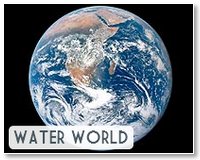| . |  |
. |
Dakar (AFP) March 22, 2010 More than 155 million people, or 39 percent of the population in West and Central Africa, do not have access to potable water, the UN's children's agency UNICEF said Monday on World Water Day. This region has the lowest coverage of potable water in the world, housing 18 percent of the world's population with no access to drinking water. "Five years to the 2015 deadline for the achievement of the Millennium Development Goals (MDG), the water and sanitation situation in West and Central Africa remains a major concern," UNICEF said in a statement. According to the organisation only eight of 24 countries in the region are on track to meet water target goals -- Benin, Burkina Faso, Cameroon, Cap Verde, Gabon, Ghana, Guinea et Mali) "The total number of people in the region without access to improved drinking-water sources actually increased over the 1990-2008 period from 126 million people to 155 million." This means that despite an improvement in coverage from 49 percent in 1990 to 61 percent in 2008 -- countries needed to reach 75 percent by 2015. "More than 155 million people (39 percent) were without access to improved drinking-water sources in 2008 and the small pace of increase failed to keep pace with the expanding population in the region," read the statement. Six countries have less than 50 percent drinking water coverage: Chad, Democratic Republic of the Congo, Equatorial Guinea, Niger, Mauritania and Sierra Leone Also of concern is the fact that 291 million people in West and Central Africa have access to no sanitation at all - in the region with the highest under-five mortality rate of all developing regions at 169 child deaths per 1,000 live births.
Share This Article With Planet Earth
Related Links Water News - Science, Technology and Politics
 In rainy Gabon, some seek water 'like in the desert'
In rainy Gabon, some seek water 'like in the desert'Libreville (AFP) March 22, 2010 Gabonese mother Jeannine Bibila is exasperated by constantly dry taps in a country that has tremendous potential for water supply. "Here, to have water, you need to search. It's like being in the desert." "In the desert, you don't find water easily. Sometimes, we go two weeks or even a month without water," explains Bibila, washing a huge pile of laundry at a public fountain in Kinguele, nor ... read more |
|
| The content herein, unless otherwise known to be public domain, are Copyright 1995-2010 - SpaceDaily. AFP and UPI Wire Stories are copyright Agence France-Presse and United Press International. ESA Portal Reports are copyright European Space Agency. All NASA sourced material is public domain. Additional copyrights may apply in whole or part to other bona fide parties. Advertising does not imply endorsement,agreement or approval of any opinions, statements or information provided by SpaceDaily on any Web page published or hosted by SpaceDaily. Privacy Statement |